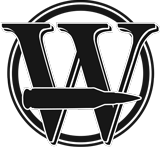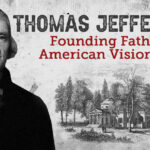
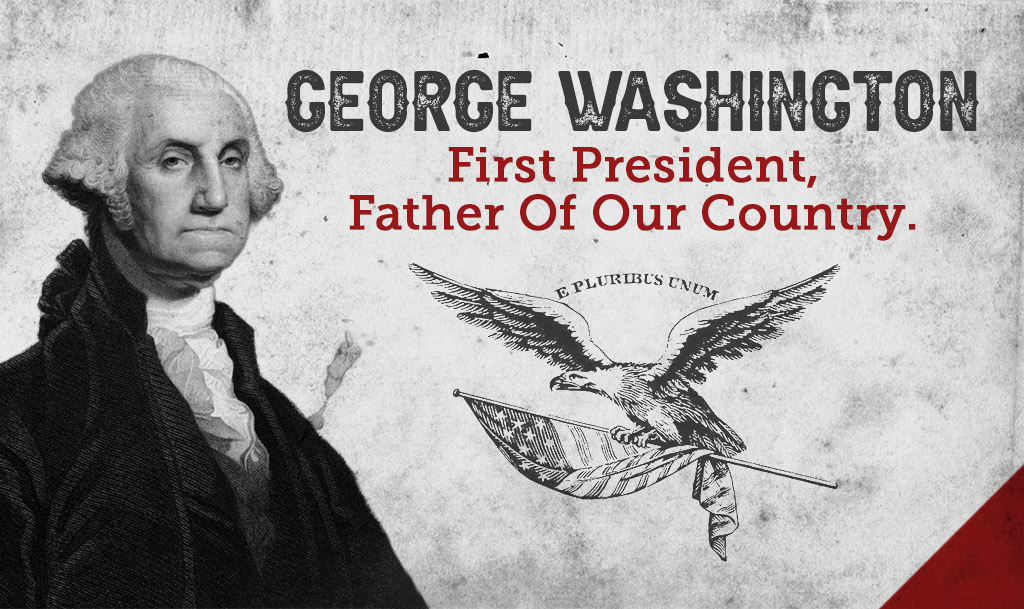
Who was George Washington? We’ve all seen the iconic image: On a cold December night in 1776, a tall, stoic figure stands at the bow of a boat crossing the icy Delaware River. The man’s army is hungry, weary, and on the brink of collapse. Still, his expression shows how he pressed forward with quiet determination.
A planter’s son from Virginia, Washington, defied the odds, leading a ragtag force to victory against the world’s mightiest empire. Later, he’d also become the first President of the United States.
I hold the maxim no less applicable to public than to private affairs, that honesty is the best policy. ” – George Washington (September 19, 1796)
Washington’s story is not just one of battles and politics. It’s the story of resilience, sacrifice, and the birth of a nation. From his early years on the Virginia frontier to the pressures of building a new government, Washington’s life reflects the struggles and triumphs of America’s founding era.
Washington was more than just a soldier or statesman. He also established leadership standards that still have an impact on the republic today and served as a symbol of solidarity during tumultuous times. His life and legacy shed light on the character of the man who became known as the “Father of His Country.”
George Washington: Early Life & Education
George Washington was born on February 22, 1732, in Westmoreland County, Virginia. Washington’s family was of modest colonial gentry status. His father, Augustine Washington, was a tobacco planter with some wealth and interests in farming and ironworks. Mary Ball Washington, his mother, raised him after Augustine’s death when George was 11.
Washington’s formal education was limited compared to that of many of his contemporaries. He studied reading, writing, mathematics, and surveying, but never attended college. Although this lack of formal schooling might have disadvantaged others, Washington’s natural intelligence, discipline, and curiosity carried him forward.
Washington had an innate talent for practical knowledge and leadership that would eventually define his public career. His early life in the Virginia countryside taught him to appreciate the land, farming, and the value of independence.
Even as a young man, Washington carried himself with seriousness and ambition. He sought opportunities to rise socially and professionally, demonstrating a blend of humility and determination that made others take notice.
Early Career & Military Beginnings
Washington began his career as a land surveyor, a profession that brought him financial independence and respect within Virginia society. At the age of 20, he inherited Mount Vernon, his family estate, which he would manage and expand throughout his life.
His ambitions soon turned to the military. In 1753, tensions between Britain and France boiled over in North America. Still in his early twenties, Washington was dispatched on a dangerous mission into the Ohio Valley. Charged with delivering a message to the French demanding they withdraw, he trekked through snow, hostile terrain, and the threat of attack. The mission, though unsuccessful in moving the French, earned Washington recognition for bravery.
The following year, Washington led troops to Fort Necessity, where his inexperience showed. Surrounded by French forces, he had to surrender—the only time he’d do so in his military career. While humbling, the event gave him hard-earned lessons in strategy and logistics.
Later, Washington participated in a disastrous expedition against French forces near Fort Duquesne with British General Edward Braddock. Washington rallied the survivors after Braddock was killed in combat, averting complete destruction. He gained the respect of both colonists and soldiers as word spread about his poise under fire.
Washington learned a great deal about colonial warfare, leadership, and military logistics from these early encounters. They also introduced him to British regulars, allowing him to learn about their advantages and disadvantages.
George Washington: Road to Revolution

The first shots of the Revolutionary War were fired at Lexington and Concord in Massachusetts.
Following the French and Indian War, Washington went back to Mount Vernon. There, he married a wealthy widow named Martha Custis in 1759. The union strengthened his position as one of Virginia’s most well-known planters by increasing his landholdings and social prestige.
Washington started to develop disenchantment with British colonial policy during the 1760s and 1770s. He especially disliked the imposition of trade restrictions and taxation without representation. Although not as fervent as men like Samuel Adams, Washington rose to prominence in Virginia’s resistance movement and became an outspoken advocate for colonial rights. His reputation as a just and moral leader made him an obvious candidate when the colonies began to organize for armed resistance.
Commander of the Continental Army
In 1775, tensions with Britain escalated into open conflict. The Second Continental Congress appointed Washington commander-in-chief of the Continental Army. He accepted without pay, underscoring his sense of duty and personal sacrifice.
Leading the Continental Army was no easy task. Washington faced shortages of supplies, poorly trained troops, and a powerful British military. Yet his leadership proved decisive. He employed a strategy of persistence, avoiding large-scale confrontations that might destroy his army while seizing opportunities for surprise victories.
Notable campaigns included the daring crossing of the Delaware River and the victory at Trenton in 1776, which revitalized American morale. Washington’s leadership and reliance on expert military trainers like Baron von Steuben helped the Continental Army become more disciplined during the brutal winter at Valley Forge (1777–1778).
With the help of French troops, the historic victory at Yorktown in 1781 effectively brought an end to significant combat. This ensured American independence and cemented Washington’s reputation as a leader committed to republican principles rather than personal ambition. His stability and refusal to claim personal authority during the war made him a hero to fledgling America.
George Washington’s Post-War & Constitutional Leadership
Washington returned to his private life at Mount Vernon following the Revolutionary War, but his retirement was brief. He reluctantly returned to public life in 1787 to chair the Constitutional Convention after it became clear that the Articles of Confederation were weak.
George Washington led the convention toward compromise and the drafting of the US Constitution with his steady hand and broad respect. He firmly supported the resulting system of government, and his presence lent legitimacy to the proceedings.
The First President of the United States
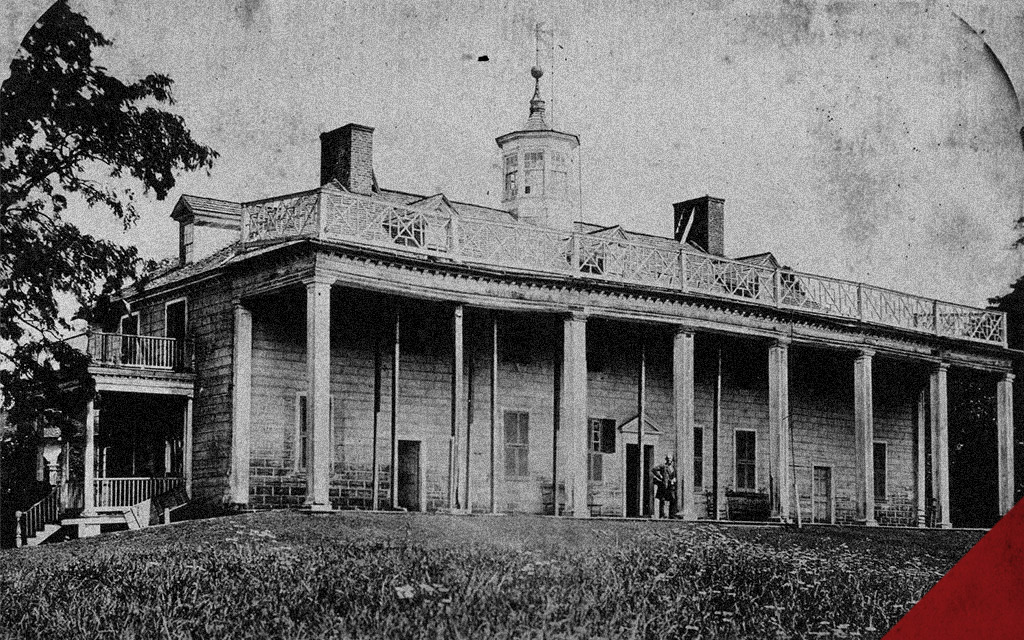
A historic photo of George Washington’s Mount Vernon home in northern Virginia, taken in the mid-1800s. (Wikipedia, Creative Commons)
The first American president, Washington, was elected unanimously in 1789. His election reflected the people’s great faith in his integrity and leadership.
As president, Washington faced the monumental task of building a functioning government from scratch. He established key precedents, including forming a cabinet of advisors, implementing a neutral foreign policy, and serving only two terms in office.
His administration also saw the passage of the Bill of Rights and the establishment of a national bank under Alexander Hamilton’s financial plan. It also suppressed domestic unrest, such as the Whiskey Rebellion. This violent protest arose in 1791 against the first tax imposed on a domestic product by the fledgling government.
Washington emphasized national unity, warning against political factions and entangling foreign alliances in his famous Farewell Address. While political divisions between Federalists and Democratic-Republicans grew during his presidency, Washington sought to rise above partisan conflict and embody the ideal of impartial leadership.
George Washington & the Continental Army’s Legacy
Washington’s role as commander of the Continental Army defined him and what he left behind. He set the standard for civilian leadership of the military by surrendering his rank in 1783 instead of trying to establish a military monarchy. This deed, which drew praise around the world, starkly contrasted with many modern revolutionaries who seized dictatorial authority.
Washington’s decision to step down from command and subsequently the presidency strengthened the idea that a republic’s leaders should place the needs of the people ahead of their ambitions.
Retirement & Final Years
After two presidential terms, Washington retired to Mount Vernon in 1797. He continued to actively manage his estate despite his steadily declining health. In 1799, at the age of 67, George Washington passed away at Mount Vernon on a calm December night. The property he had devoted his life to establishing and defending surrounded him.
Leaders and citizens alike lamented not only the man but also what he stood for. Word of his passing spread throughout the fledgling republic and beyond. Both domestically and internationally, people expressed their sorrow and paid tribute to his bravery, moral character, and selflessness.
George Washington’s Legacy
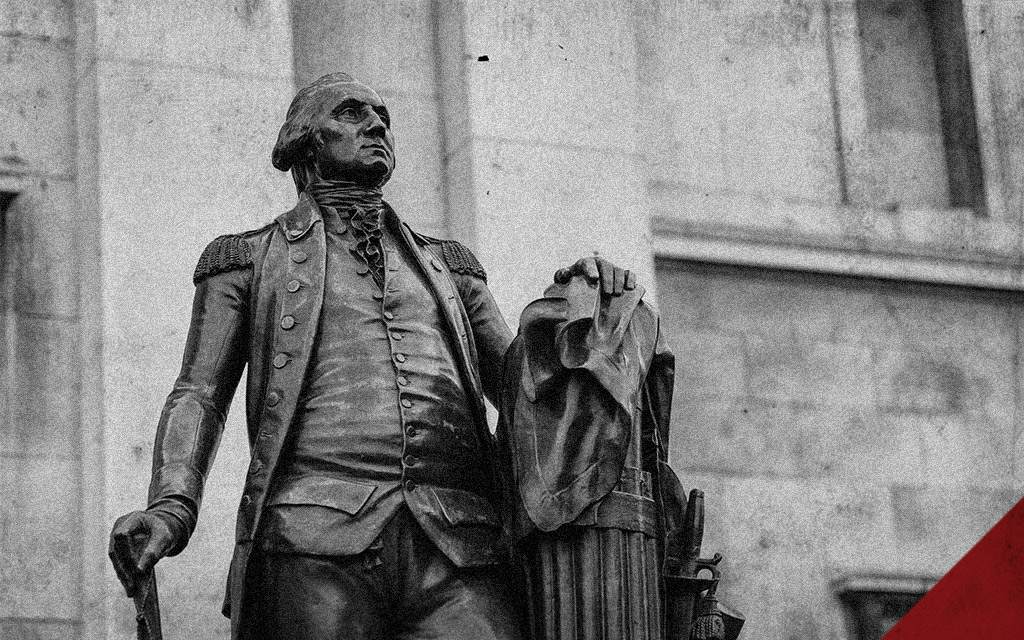
Washington’s legacy is defined by winning independence, establishing our government, and setting crucial precedents as the first president.
Washington’s legacy extends beyond his achievements as the first president and a military commander. He embodied the values of accountability, altruism, and republicanism that formed the foundation of the United States’ political legacy. His giving up authority, unwavering leadership in times of crisis, and vision for national unity revolutionized the United States.
From the Revolutionary War to the founding of the presidency, Washington’s influence shaped the nation’s nature and trajectory. He is still recognized as a leader who exemplifies integrity, strength, and statesmanship. Our first president’s example continues to motivate others.
A free people ought not only to be armed, but disciplined; to which end a uniform and well-digested plan is requisite; and their safety and interest require that they should promote such manufactories as tend to render them independent of others for essential, particularly military, supplies. ” – George Washington (January 8, 1790)
George Washington’s vision, discipline, and unwavering sense of duty helped shape a nation. He’s still regarded as one of the most enduring figures in American history. From humble beginnings, Washington led the Continental Army, guided the colonies through the Revolutionary War, and became the first President of the United States.
He was born into colonial Virginia society. More than a soldier or statesman, he established leadership standards that still impact the republic today and served as a symbol of solidarity during tumultuous times. His life and legacy shed light on the character of the man who became known as the “Father of His Country,” as well as the hardships faced by a young nation.
Love historical overviews of our Founding Fathers? Read our piece on Thomas Jefferson: An American Visionary.
